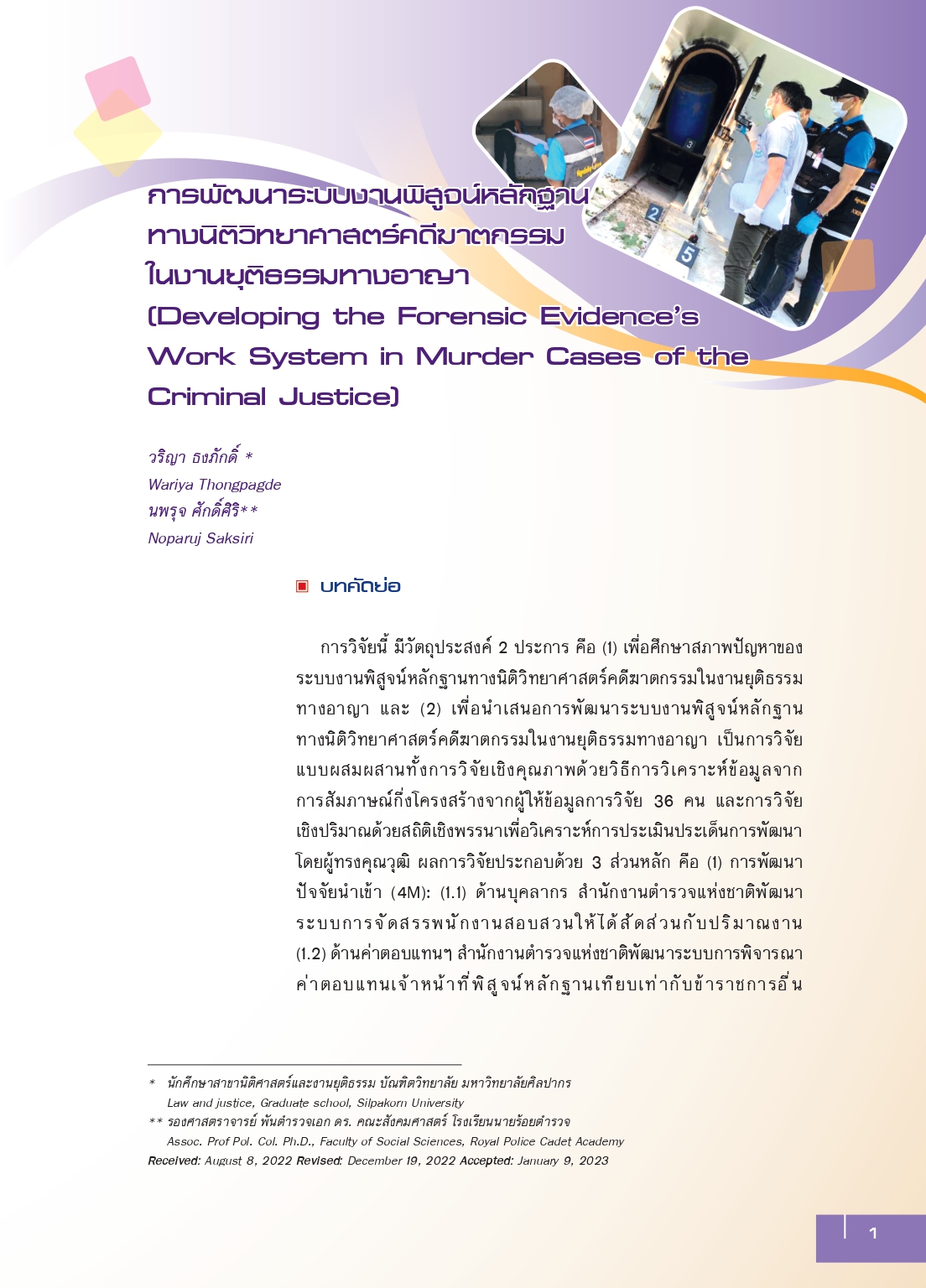การพัฒนาระบบงานพิสูจน์หลักฐานทางนิติวิทยาศาสตร์คดีฆาตกรรมในงานยุติธรรมทางอาญา
Main Article Content
บทคัดย่อ
การวิจัยนี้ มีวัตถุประสงค์ 2 ประการ คือ (1) เพื่อศึกษาสภาพปัญหาของระบบงานพิสูจน์หลักฐานทางนิติวิทยาศาสตร์คดีฆาตกรรมในงานยุติธรรมทางอาญา และ (2) เพื่อนำเสนอการพัฒนาระบบงานพิสูจน์หลักฐานทางนิติวิทยาศาสตร์คดีฆาตกรรมในงานยุติธรรมทางอาญา เป็นการวิจัยแบบผสมผสานทั้งการวิจัยเชิงคุณภาพด้วยวิธีการวิเคราะห์ข้อมูลจากการสัมภาษณ์กึ่งโครงสร้างจากผู้ให้ข้อมูลการวิจัย 36 คน และการวิจัยเชิงปริมาณด้วยสถิติเชิงพรรนาเพื่อวิเคราะห์การประเมินประเด็นการพัฒนาโดยผู้ทรงคุณวุฒิ ผลการวิจัยประกอบด้วย 3 ส่วนหลัก คือ (1) การพัฒนาปัจจัยนำเข้า (4M): (1.1) ด้านบุคลากร สำนักงานตำรวจแห่งชาติพัฒนาระบบการจัดสรรพนักงานสอบสวนให้ได้สัดส่วนกับปริมาณงาน (1.2) ด้านค่าตอบแทนฯ สำนักงานตำรวจแห่งชาติพัฒนาระบบการพิจารณาค่าตอบแทนเจ้าหน้าที่พิสูจน์หลักฐานเทียบเท่ากับข้าราชการอื่น (1.3) ด้านวัสดุอุปกรณ์ สำนักงานตำรวจแห่งชาติพัฒนาการบริหารจัดการด้านวัสดุอุปกรณ์เพื่อรองรับการดำเนินงานของพนักงานสอบสวนตามความจำเป็นให้มีความสะดวกคล่องตัวกรณีเร่งด่วน และ (1.4) ด้านวิธีการ กระทรวงสาธารณสุขและสำนักงานตำรวจแห่งชาติร่วมกันพัฒนาระบบการขนย้ายศพไปยังโรงพยาบาลที่มีความพร้อมอย่างรวดเร็วโดยเก็บรักษาศพให้อยู่ในสภาพเดิม (2) การพัฒนาด้านกระบวนการ (POCCC): (2.1) ด้านการวางแผน สำนักงานตำรวจแห่งชาติพัฒนาระบบการวางแผนการประเมินผลตามแผนยุทธศาสตร์โดยเพิ่มตัวชี้วัด เช่น การอำนวยความยุติธรรมแก่ประชาชน ฯลฯ (2.2) ด้านการจัดการองค์กร สำนักงานตำรวจแห่งชาติพัฒนาระบบการจัดการองค์กร แบ่งงานชัดเจนไม่ทับซ้อน ลดสายบังคับบัญชาเพื่อป้องกันการแทรกแซงการปฏิบัติงาน (2.3) ด้านการสั่งการ สำนักงานตำรวจแห่งชาติพัฒนาระบบการสั่งการ เปลี่ยนแปลงโยกย้ายพนักงานสอบสวนด้วยหลักเกณฑ์ที่ชัดเจนและเป็นธรรม (2.4) ด้านการควบคุม สำนักงานตำรวจแห่งชาติพัฒนาระบบการกำกับดูแลและบริหารงานให้ประชาชนใช้สิทธิเข้าถึงงานสอบสวนได้อย่างสะดวก รวดเร็ว เท่าเทียม และเป็นธรรม และ (2.5) ด้านการประสานงาน สำนักงานตำรวจแห่งชาติผลักดันให้เกิดการประสานงานร่วมกันอย่างสะดวก ราบรื่น มุ่งสู่เป้าหมายเดียวกัน (3) การพัฒนาสภาพแวดล้อมของระบบ (กระบวนการยุติธรรมทางอาญา): (3.1) ชั้นสอบสวน สำนักงานตำรวจแห่งชาติพัฒนามาตรการตรวจสอบ ควบคุม และช่วยเหลือกรณีพนักงานสอบสวนส่งสำนวนให้พนักงานอัยการล่าช้า (3.2) ชั้นสั่งคดี สำนักงานอัยการสูงสุดร่วมกับศาล กระทรวงยุติธรรม กระทรวงสาธารณสุข และสำนักงานตำรวจแห่งชาติพัฒนาประมวลกฎหมายวิธีพิจารณาความอาญาให้ทันสมัย และ (3.3) ชั้นพิจารณาคดีและสืบพยาน ศาลร่วมกับสำนักงานอัยการสูงสุด กระทรวงยุติธรรม กระทรวงสาธารณสุข สำนักงานตำรวจแห่งชาติ และสภาทนายความพัฒนาระบบการพิจารณาคดีและสืบพยานด้วยการค้นหาความจริงแห่งคดีอย่างเท่าเทียม
Article Details

อนุญาตภายใต้เงื่อนไข Creative Commons Attribution-NonCommercial-NoDerivatives 4.0 International License.
ต้นฉบับที่ได้รับการตีพิมพ์ในวารสาร เป็นลิขสิทธิ์ของวารสารกระบวนการยุติธรรม แต่ความคิดเห็นที่ปรากฏในเนื้อหาของบทความในวารสารกระบวนการยุติธรรม ถือเป็นความรับผิดชอบของผู้เขียนแต่เพียงผู้เดียว
เอกสารอ้างอิง
ณัฎฐ์ สมบูรณ์. (2551). การมีส่วนร่วมของทนายความในการค้นหาพยานหลักฐานทางนิติวิทยาศาสตร์ในคดีอาญา. วิทยานิพนธ์ปริญญานิติศาสตรมหาบัณฑิต. มหาวิทยาลัยรามคำแหง.
ณัฐสกล อรรจนสุพพัติ. (2554). การรวบรวมพยานหลักฐาน ศึกษากรณีคดีฆาตกรรมนางสาวเชอรี่ แอนด์ ดันแคน. ม.ป.ท.: โรงเรียนนายร้อยตำรวจ.
ธนาชัย ศรีวิรุฬห์ชัย. (2554). ปัญหาการตรวจสอบถ่วงดุลการงดการสอบสวน: มาตรา 150 วรรคสาม. วิทยานิพนธ์ปริญญานิติศาสตรมหาบัณฑิต. มหาวิทยาลัยธรรมศาสตร์.
ประสิทธิ์ นพกาศ. (2553). การรวบรวมพยานหลักฐาน ศึกษากรณีฆาตกรรมนางสาวเจนจิรา พลอยองุ่นศรี. ม.ป.ท.: โรงเรียนนายร้อยตำรวจ.
พงษ์เทพ จันทร์เจริญ. (2553). การศึกษาการรวบรวมพยานหลักฐานคดีฆาตกรรมนายปรีณะ ลีพัฒนะพันธ์. ม.ป.ท.: โรงเรียนนายร้อยตำรวจ.
พัชรา สินลอยมา. (2555). การพัฒนาประสิทธิภาพการอำนวยความยุติธรรมของสำนักงานตำรวจแห่งชาติให้กับประชาชนด้านการรวบรวมพยานหลักฐานและการพิสูจน์หลักฐาน. รม.ป.ท.: โรงเรียนนายร้อยตำรวจ.
พิชัย นิลทองคำ. (2562). ประมวลกฎหมายวิธีพิจารณาความอาญา. กรุงเทพฯ: โรงพิมพ์อฑตยา.
วิฑูรย์ อึ้งประพันธ์. (2543). แนวทางพัฒนางานนิติเวชในกระบวนการยุติธรรม. กรุงเทพฯ: มูลนิธิสถาบันกฎหมายอาญา.
สำนักงานตำรวจแห่งชาติ. (2562). คู่มือการปฏิบัติงานด้านนิติวิทยาศาสตร์ในการสืบสวนสอบสวน. กรุงเทพฯ: โรงพิมพ์ตำรวจ สำนักงานตำรวจแห่งชาติ.
สุรยุทธ อ่วมสำอางค์. (2554). การศึกษาปัญหาและอุปสรรคของพนักงานสอบสวนในการเก็บรวบรวมพยานหลักฐานด้านนิติวิทยาศาสตร์ประกอบสำนวนการสอบสวนคดีอาญา. วิทยานิพนธ์ปริญญาศิลปศาสตรมหาบัณฑิต. มหาวิทยาลัยธรรมศาสตร์.
Bittel, L. R. (1978). Encyclopedia of professional management, an authoritative guide to the profitable practice of management. New York: McGraw-Hill.
David, A. S., & Paul, L. S. (2015). Critical review of forensic trace evidence analysis and the need for a new approach. Forensic Science International, 251, 159-170.
Ivancevich, J. M. &Stewart, K. A. (1989). Appraising management talent in acquired organizations: A four-tiered recommendation. Trade Journal, 12(2), 69-86.
Linzi, M., Wilson-Wilde., James, B., & Stephen, J. G. (2011). The future of forensic science standards. Forensic Science International: Genetics Supplement Series, 3(1), 333-334.
Morgan, R. M. and Levin, E. A. (2019). A crisis for the future of forensic science: Lessons from the UK of the importance of epistemology for funding research and development. Forensic Science International: Synergy, 1, 243-252.


